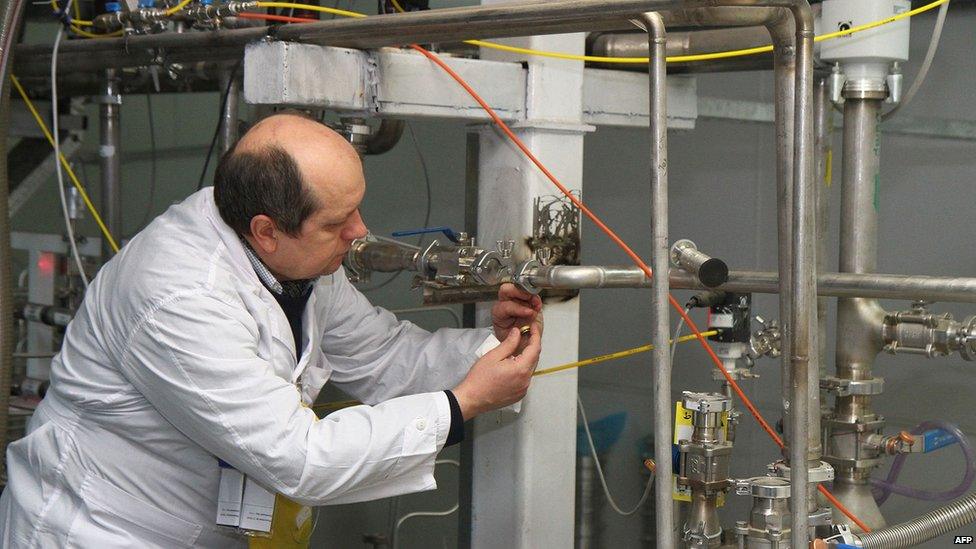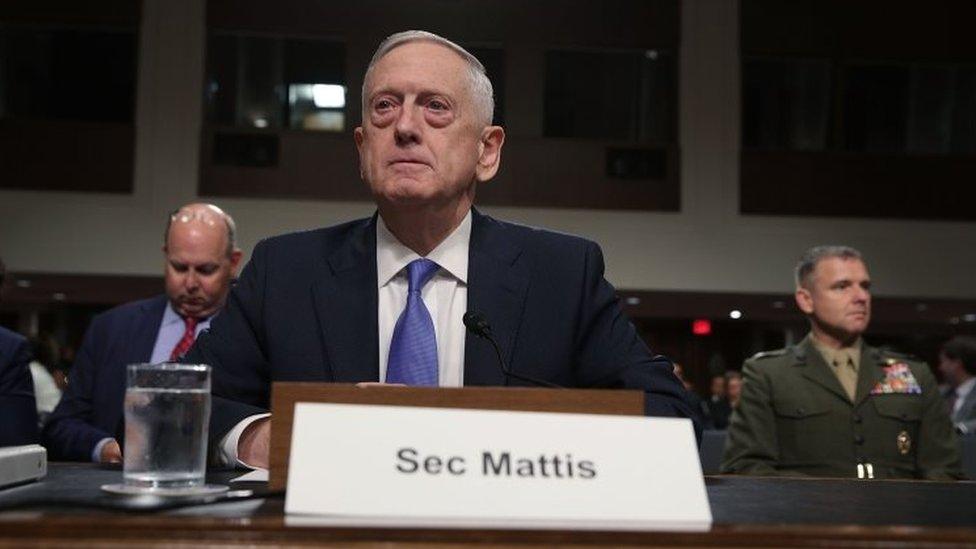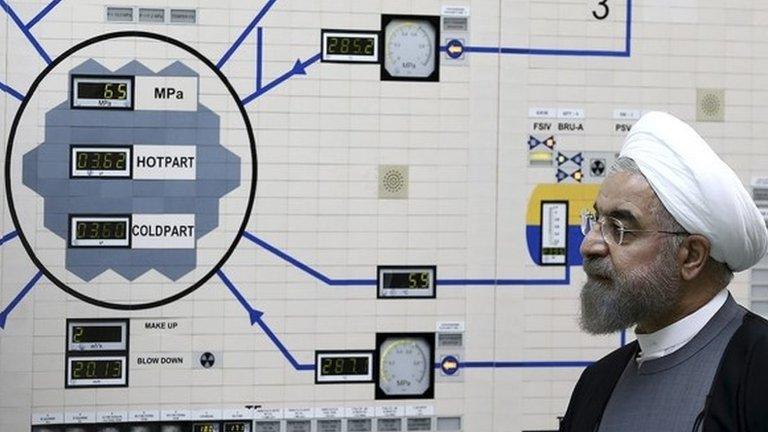Trump might 'abandon Iran nuclear deal'
- Published
Donald Trump makes cryptic comments about "calm before the storm"
US President Donald Trump is planning to abandon the Iran nuclear deal shortly, according to US media reports.
If he fails to certify the accord, Congress will decide whether to re-impose economic sanctions on Iran. Mr Trump has until 15 October to decide.
Opposition to the deal was a major part of his campaign last year.
Posing for photographers with military leaders on Thursday, he said this was "the calm before the storm" but refused to give further details.
There was speculation his comments might refer to heightened tensions with North Korea, but the New York Times says "people who have been briefed on the matter" believe he means Iran.
Mr Trump was seen at the White House with his wife Melania, as well as military leaders, after Thursday's meetings but before dinner together. Gesturing at the people around him, he asked the waiting press if they knew "what this represents".
"Maybe it's the calm before the storm," he said.
When reporters pressed him on what storm he was referring to, he would only say: "You'll find out."
He had earlier told his top defence officials he expected them to provide "a broad range of military options... at a much faster pace" in future.
What happens next?
US media say the president will announce next Thursday that he will not be certifying the deal on the grounds it does not serve US security interests.
But some of his top advisers, such as Defence Secretary James Mattis, appear to back the deal.
The presidency must certify the deal every 90 days; Mr Trump has already done so twice.
If he rejected it this time, Congress would have 60 days to decide whether to re-impose sanctions on Iran. US media reports suggest they are likely to leave the deal in place.
Speaking in the White House's Cabinet Room, President Trump said: "The Iranian regime supports terrorism and exports violence and chaos across the Middle East.
"That is why we must put an end to Iran's continued aggression and nuclear ambitions. You will be hearing about Iran very shortly."
In reaction, Iranian nuclear chief Ali Akbar Salehi said the deal was not renegotiable, reported Iran's Press TV.
But he suggested it might be salvageable if the other partners - France, Germany, China, Russia and the UK - remained on board. If not, he said, the deal will "definitely fall apart".
Russian Foreign Minister Sergei Lavrov said he hoped "the final decision reached by the US president will be balanced and will be based on the present-day realities", reported Interfax news agency.

Will Congress let it stand?
Analysis by the BBC's Anthony Zurcher
Once again the president appears poised to hand a tough issue over to Congress to deal with.
In July Mr Trump ended an Obama-era programme offering normalised immigration status to undocumented immigrants who entered the US as children - and gave Congress six months to come up with a legislative solution.
They're still working on that one, sort of, and now Congress has another tricky situation to resolve while the clock is ticking.
There's plenty of sentiment among Republicans to impose stringent new sanctions on the Iranian regime. The risks, however, of tearing up a multinational deal that international relations experts say has helped keep Iranian nuclear ambitions in check is great.

Under the terms of the deal, Iran must let investigators access any site they deem suspicious
As with healthcare, another issue the White House has given Congress little guidance on, legislators will have to decide between their at-times overheated campaign promises and more practical concerns.
Given that inertia is on the side of inaction, the Iranian nuclear deal - though weakened by the president's sabre-rattling - may hold together.
One thing is certain, however. The president's decision would inject new levels of acrimony into US-Iranian relations and again put a blazing spotlight on congressional politicians who are already anxiously eying their re-election campaigns in 2018.

What is the Iran nuclear deal?
The 2015 Joint Comprehensive Plan of Action was designed to prevent Iran developing a nuclear weapon, with the president's administration having to certify to Congress that Iran is upholding its part of the deal every 90 days.
It lifted some sanctions that stopped Iran from trading on international markets and selling oil.
The lifting of sanctions is dependent on Iran restricting its nuclear programme. It must restrict its uranium stockpile, build no more heavy-water reactors for 15 years, and allow inspectors in to the country.
Mr Trump has repeatedly said Iran has broken the "spirit" of the deal.
In a speech to the UN General Assembly, Mr Trump called the deal, which was brokered while his predecessor Barack Obama was in power, "an embarrassment to the United States".
President Trump and Iran's President Rouhani traded insults at the UN
- Published22 September 2017
- Published3 October 2017

- Published17 May 2017

- Published22 May 2017